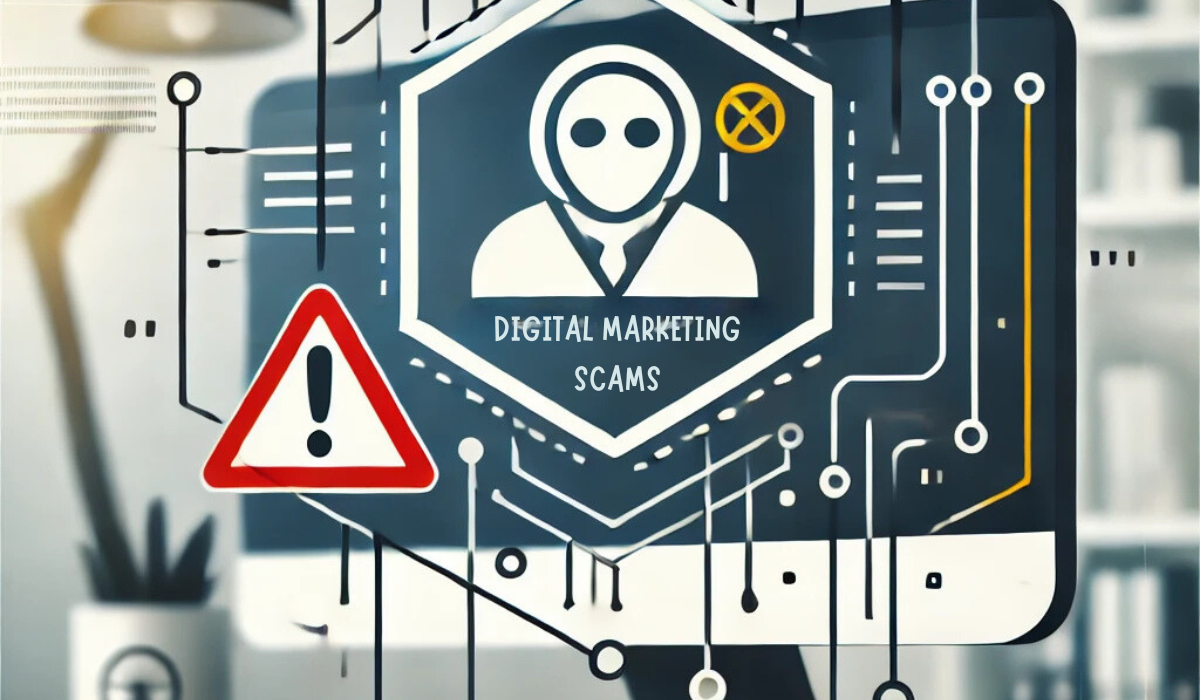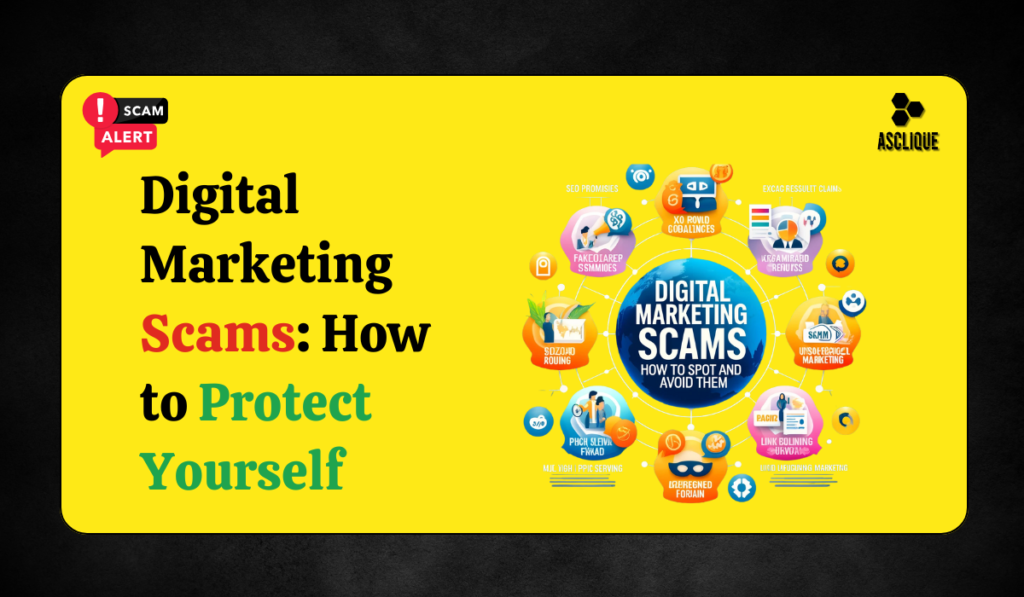Digital marketing is a vital component of today’s businesses for engaging with the audience, increasing brand awareness and sales, in this digital age. Mirroring this growth is the emergence of digital marketing scams that prey on businesses or individuals seeking to tap into the potential of the web. Is digital marketing actually a scam or is it a legitimate marketing method? The truth lies somewhere in between. The internet is full of fraudulent actors who exploit unsuspecting clients while in as much as digital marketing has proven and efficient in business growth.
This article discusses some common digital marketing scams, how they are spotted, and how people can avoid falling prey to such practices.
Understanding Digital Marketing Scams
Digital marketing scams include those unethical or dishonest practices that are usually perpetuated by rogue marketers or agencies. These scammers are known to take advantage of business owners who don’t understand the digital marketing environment. Most common scams in the world of digital marketing range from fake promises of instant results to shady schemes that can actually harm your business in the long run.
Common Digital Marketing Scams

Here are some of the most common digital marketing scams and how to avoid them:
Overhyped Results Promises
Definition: Some digital marketers overpromise in terms of providing traffic, sales, or engagement. “1000% growth in traffic,” or “leads guaranteed” without any actual data to back up the promise is a red flag.
How to Avoid: Choose marketing firms that give data-driven results, authentic case studies, or client testimonials that prove success. Be on alert for digital marketing scams promising impossible outcomes.
Ghosting Clients
Description: In this scam, marketers accept your payment and ghost you after. Once they take their fees, they stop working on your project without showing any kind of result.
How to Avoid: Select agencies that will have clear communication regarding how they will execute their plan and whose reputation is verified. Ensure the contract includes clear deliverables and timelines to avoid digital marketing scams.
Unclear Billing and Hidden Fees
Description: Some agencies hide additional fees in their pricing structure, which can inflate the cost of services without delivering any value.
How to Avoid: Always ask for a breakdown of the costs and make sure you have an absolute, upfront contract that breaks down every single fee and charge so that you avoid digital marketing scams.
Ethics Violating Link Building Services
Description: Scammers sell link-building services selling low-quality backlinks from spammy sites which might spam your SEO rank and even result in penalties from Google.
How to Avoid: Make sure the link building is done properly through quality organic links from authority domains and not digital marketing scams selling cheap backlinks.
Fake Social Media Engagement
Description: Agencies that offer to get you thousands of new followers or likes may be using bots to increase your numbers. Therefore, you may end up with fake engagement that doesn’t serve the purpose of real results.
How to Avoid: Instead of becoming victimized by digital marketing scams, look for service providers which focus on real engagement like targeted ads, organic content marketing, and community building.
Deceptive Influencer Marketing
Definition: Some influencers boast to have a high-profile subscriber base, but in reality, these followers are dead or fake. Fraudsters keep duping companies into wasting money on unsuccessful influencer programs.
How to Steer Clear: Check if an influencer has high engagement rates and whose subscribers are genuine before entering into any campaign to avoid digital marketing fraud.
Overpriced or Underperforming Services
Description: Many digital marketers charge very high fees for services and provide little return for the amount charged. Conversely, low-cost services may not deliver the results promised.
How to Avoid: Compare the prices of agencies, and their offered services should match your goals for your business. Seek clear KPIs with regular updates to avoid being scammed by digital marketing.
Fake Website Traffic Services
Description: The con artists claim to boost your website’s traffic with bots or artificial visitors. This counterfeit traffic can skew your analytics without offering any value.
Avoid non-delivery email lists: Engage in organic and authentic traffic generation techniques, such as SEO, content marketing, and social media marketing. Any service that claims high traffic volume without providing a clear strategy to safeguard your digital marketing operation should be avoided.
Non-Existential Links
Description: Some companies claim to sell lists of potential customers, but these lists often contain outdated or non-opt-in emails. This can lead to high bounce rates and damage your email reputation.
How to Avoid: Build your email list organically through valuable content and incentives. Choose email marketing services that prioritize consent-based lists, steering clear of digital marketing scams selling outdated lists.
Fake Reputation Management
Description: Some agencies promise to clean up your online reputation by suppressing unfavorable content. They may produce fake reviews or participate in some other manners that do not work well in the long term.
How to Avoid: Engage with an agency that uses responsible reputation management practices, and don’t fall for that scam of digital marketing using fake testimonials.
Social Proof Scam
Description: Scammers may be showing phony testaments or case studies for the purpose of validation. They are using some stock photos or fabricated feedback to authenticate their company.
How to Avoid: Verify those testimonials and case studies by checking references or even directly reaching out to past clients to avoid being scammed by these digital marketing cons.
Is Digital Marketing a Scam or Not?
So, is digital marketing a scam? Absolutely not. In fact, digital marketing is a genuinely powerful strategy for businesses of all sizes. However, the spread of fraudulent practices led many to discredit digital marketing in general. Digital marketing can certainly produce tremendous results, but scammers took advantage of the business boom by spreading ridiculously unsustainably high claims or shady tactics.
The point of division between legitimate digital marketing and digital marketing scams is transparency and accountability. A legitimate agency would ensure that realistic expectations are set, broad insight to methods they use, and performance reports are offered. Digital marketing scams promise unrealistic results and avoid offering clear, verifiable results.
How to Identify and Dodge Digital Marketing Scams
To ensure falling off the wrong trap of digital marketing scams, it is important to know what to look for:
Unrealistic Promises: Be very cautious if someone promises overnight success or unrealistic results. Legitimate agencies always deal with long-term and sustainable growth using well-tested strategies such as SEO, content marketing, and social media; it is not a digital marketing scam.
Lack of Transparency: If an agency denies explaining their methods or refuses to provide performance reports, then it is a red flag. A good marketer will not shy away from explaining their processes and will provide regular performance reports to avoid scams in digital marketing.
High-Pressure Sales Tactics: Scammers will often use high-pressure sales tactics to get you to sign up quickly. A respectable agency will give you time to consider their offer and does not rush you into a decision to avoid digital marketing scams.
Too Good to Be True: If it sounds too good to be true, then probably it is. Be suspicious of those services promising unusually high ROI and requiring very low fees. Although digital marketing can be cheap, very low prices might mean that the services are inferior or even scams.
Lack of Client Testimonials or Case Studies: Real agencies usually have verified client testimonials, case studies, and previous successes. Scammers are not in a position to deliver any proof of their successes.
No Clear Contract or Terms: Always make sure you have a written agreement that states what is covered, payment plans, and timelines. If an agency is reluctant to provide a contract, it’s one major red flag for digital marketing scams.
How to Avoid Digital Marketing Scams
To keep from falling victim to digital marketing scams, do the following:
- Do Your Homework: Always research the agency or freelancer before hiring. Check reviews, client feedback, and ratings on trusted sites.
- Ask for Proof: Request case studies, reports, or data that prove an agency’s ability to deliver results. Legitimate agencies will be happy to prove their success.
- Set Realistic Expectations: Digital marketing does not happen overnight. Be wary of quick results, and focus on long-term growth strategies to avoid falling victim to digital marketing scams.
- Trust Your Instincts: If something does not feel right, trust your instincts and look for a more credible agency to avoid digital marketing scams.
Conclusion
While there are indeed digital marketing scams, digital marketing is a legitimate and powerful vehicle for accelerating growth in your business. Success lies in the detection and avoidance of these scams through knowledge, caution, and work with truthful and transparent agencies. Just remember: true marketers focus on steady growth over time, fair practices, and clear communication-let that deter your business from succeeding.

